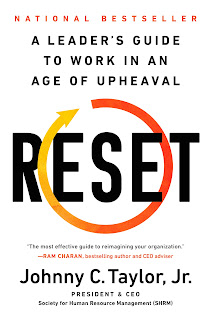Part call to action, part strategic roadmap, RESET, the book by Johnny C. Taylor, Jr., challenges leaders’ underlying assumptions about workers and the workplace.
Taylor, the CEO and President of the Society for Human Resource Management (SHRM), shares his personal experiences and candid, compassionate and practical thoughts on how to transform the way to select, retain and train employees in today’s, post-COVID and radically changed business environment.
“With the growth of remote work and an increased focus on diversity and inclusion, companies are increasingly finding themselves in ‘wars for talent’ as they source and recruit candidates from all over the world,” explains Taylor. “They need to find new ways to contact people and new sources of talent. They need to create an enduring and tangible culture that helps everyone feel empowered to do their best work. And they need to develop inclusive organizations that leverage differences for growth and innovation.”
Informed by 70 years of original SHRM research and expertise, Taylor explains how to avoid returning to “how things were,” and how to elevate to a new normal by:
- Putting the “human” back into Human Resources, where innovation must happen.
- Tapping into a company’s hidden or non-traditional talent pools.
- Using crisis as a catalyst for reimagining your company culture.
- Creating a diverse culture for talent to thrive.
- Redefining the employee experience.
- Revealing the 10 workplace policies for our post-pandemic world.
One of my favorite takeaways from the book is Taylor’s teachings on the top drivers of a culture of innovation. He explains that culture needs:
- Positive Interpersonal Exchange – There is a strong sense of cohesion across the organization, and employees feel like they are all playing for the same team.
- Intellectual Stimulation – Debate and discussion are encouraged and supported.
- Challenge – Workers feel that their jobs are challenging, complex, and interesting, but at the same time not overly stressful.
- Flexibility and Risk Taking – The organization is willing to take risks and deal with the uncertainty and ambiguity that tend to go hand in hand with innovation.
- Top-Level Support – Employees view top management as supportive of new ideas.
- Innovative Compensation and Benefits – Top talent know they will be reward for innovations.
Taylor’s career spans more than 20 years as a lawyer, human resources executive, and CEO. He is a member of the White House American Workforce Policy Advisory Board and was appointed as Chairman of the President's Advisory Board on Historically Black Colleges and Universities.
RESET is one of the most valuable and useful reads for leaders today.
Thank you to the book’s publisher for sending me an advance copy of the book.

_sm.jpg)
Comments
Post a Comment